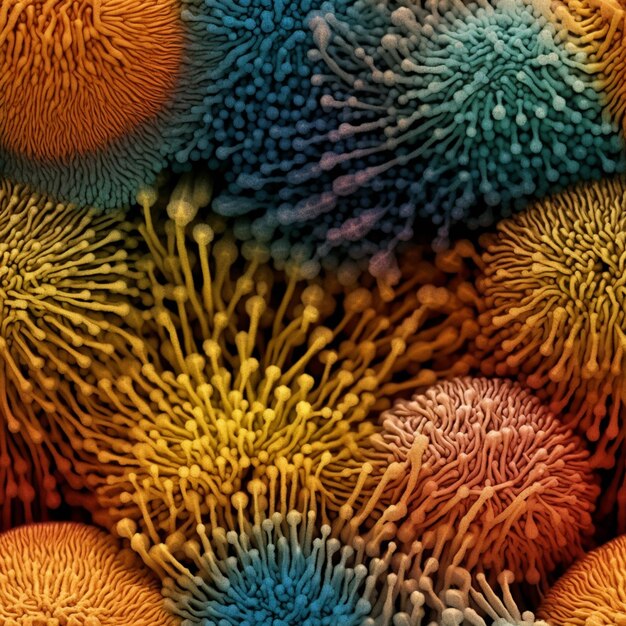Gut Microbiome Research: Impact on Overall Health

The latest research on the gut microbiome unveils its profound and multifaceted influence on overall health, extending far beyond digestion to encompass immunity, mental well-being, and chronic disease prevention.
The intricate world within our gut, often referred to as the “second brain,” is far more than just a digestive organ. The latest research on the gut microbiome and its impact on overall health reveals a complex ecosystem of trillions of microorganisms profoundly influencing everything from immunity to mood. This dynamic field of study is continually unearthing new connections, offering groundbreaking insights into preventing and managing various health conditions.
Understanding the Gut Microbiome
The gut microbiome refers to the vast community of bacteria, viruses, fungi, and other microorganisms residing primarily in the large intestine. Far from being passive inhabitants, these microbes are active participants in numerous physiological processes. They engage in a complex interplay with our bodies, influencing metabolism, immunity, and even neurological functions.
Initially, scientific focus on the gut was largely limited to its digestive capabilities. However, as molecular biology techniques advanced, particularly next-generation sequencing, researchers gained unprecedented access to the microbial world within. This allowed for detailed characterization of microbial diversity and functional potential, revealing a universe of microscopic collaborators.
The composition of an individual’s microbiome is unique, shaped by factors such as genetics, diet, lifestyle, and early life exposures. A balanced and diverse microbiome, rich in beneficial species, is increasingly recognized as a cornerstone of good health, while imbalances, known as dysbiosis, are linked to a spectrum of adverse health outcomes.
The Foundation of Gut Health
A healthy gut microbiome is characterized by its diversity and the abundance of symbiotic microbes. These beneficial bacteria perform essential functions that our human cells cannot, creating a mutually beneficial relationship. Understanding this foundational aspect is crucial to appreciating its broader impact.
- Digestive Aid: Breaks down complex carbohydrates and fiber into short-chain fatty acids (SCFAs).
- Vitamin Synthesis: Produces essential vitamins like K2 and certain B vitamins.
- Pathogen Defense: Outcompetes harmful bacteria, preventing their overgrowth and colonization.
- Immune System Modulation: Educates and trains the immune system from an early age.
Maintaining this delicate balance is a continuous process, influenced significantly by our daily choices. Diet plays a particularly critical role, as the food we consume directly feeds our gut microbes, determining which species thrive and which decline.
Emerging Research Tools and Techniques
The rapid expansion of microbiome research is largely due to technological advancements. New tools allow scientists to analyze microbial communities with unprecedented detail, moving beyond simply identifying species to understanding their functional roles.
Techniques such as metagenomics, metatranscriptomics, metaproteomics, and metabolomics provide comprehensive insights into the genetic potential, gene expression, protein production, and metabolic output of the microbial community. This multi-omics approach enables a holistic view of the microbiome’s activities and interactions with the host.
Furthermore, bioinformatics and computational modeling are essential for interpreting the vast amounts of data generated. These tools help identify patterns, predict interactions, and build models that simulate the complex dynamics of the gut ecosystem, paving the way for targeted interventions.
These sophisticated methodologies are crucial for elucidating the precise mechanisms through which the gut microbiome influences human health and disease. They allow researchers to move beyond simple correlations to establish causal relationships, which is vital for developing effective therapies.
Gut Microbiome and Immune System Regulation
One of the most profound connections uncovered by recent research is the intricate relationship between the gut microbiome and the immune system. The gut houses approximately 70-80% of the body’s immune cells, making it a pivotal site for immune education and regulation. The constant interaction between gut microbes and these immune cells shapes our immune responses, influencing susceptibility to infections, allergies, and autoimmune diseases.
Beneficial gut bacteria contribute to the development and proper functioning of immune cells, including T cells and B cells. They produce metabolites, such as short-chain fatty acids (SCFAs), which exert powerful immunomodulatory effects. For instance, butyrate, a key SCFA, is known to strengthen the gut barrier, reduce inflammation, and regulate immune cell differentiation.
Dysbiosis, an imbalance in the gut microbial community, can lead to chronic low-grade inflammation, often referred to as “leaky gut.” In this state, the integrity of the intestinal barrier is compromised, allowing microbial components and toxins to translocate into the bloodstream, triggering systemic immune responses and contributing to various inflammatory conditions throughout the body.
Mechanisms of Immune Modulation
The gut microbiome influences the immune system through several key mechanisms. Understanding these pathways is essential for developing interventions that leverage microbial power for immune health.
- T-cell Differentiation: Certain bacteria promote the development of regulatory T cells (Tregs), which suppress excessive immune responses.
- Antimicrobial Peptide Production: Gut microbes stimulate the host to produce antimicrobial peptides, enhancing local defenses.
- Metabolite Signaling: SCFAs produced by bacteria act as signaling molecules, directly influencing immune cell function.
- Bile Acid Metabolism: Gut microbes modify bile acids, which can impact diverse immune processes and inflammation pathways.
These interactions are not static; they are dynamic and constantly adapting to environmental cues. Diet, stress, medications, and exposure to pathogens all play a role in shaping this intricate dialogue between microbes and immunity.
Autoimmune Diseases and Allergies
A growing body of evidence implicates gut dysbiosis in the development and progression of autoimmune diseases and allergies. Conditions like inflammatory bowel disease (IBD), rheumatoid arthritis, type 1 diabetes, and multiple sclerosis are increasingly linked to specific alterations in the gut microbiome.
For example, in IBD, an altered gut microbial composition is thought to contribute to chronic intestinal inflammation. Similarly, research in allergic conditions like asthma and eczema suggests that early life microbial exposures and diversity play a crucial role in programming immune tolerance.
The “hygiene hypothesis” has evolved into the “old friends hypothesis,” proposing that lack of exposure to diverse microbes in modern highly sanitized environments may impair immune system development, leading to increased susceptibility to allergic and autoimmune disorders. This highlights the importance of microbial diversity for robust immune health.
The Gut-Brain Axis: A Bidirectional Connection
Perhaps one of the most fascinating areas of recent gut microbiome research is the exploration of the gut-brain axis. This bidirectional communication pathway links the central nervous system (brain) with the enteric nervous system (gut), involving complex interactions between the gut microbiome, immune system, vagus nerve, and neuroendocrine pathways. It highlights how the state of our gut can directly influence our mood, cognition, and behavior.
The gut microbes produce a myriad of neuroactive compounds, including neurotransmitters like serotonin and gamma-aminobutyric acid (GABA), which are essential for brain function. While most of these are produced within the gut and might not directly cross the blood-brain barrier, they can signal to the brain via the vagus nerve or by influencing the immune system and circulating metabolites.
Dysbiosis in the gut microbiome has been linked to various neurological and psychiatric conditions, including depression, anxiety, autism spectrum disorder, and even neurodegenerative diseases like Parkinson’s and Alzheimer’s. This emerging field of psychobiotics investigates how specific beneficial bacteria or microbiota-derived metabolites can influence mental health outcomes.
How Microbes Influence Mood and Cognition
The mechanisms by which gut microbes affect the brain are multifaceted and still being unraveled, yet some key pathways are becoming clearer.
- Neurotransmitter Production: Gut bacteria produce precursors or even neurotransmitters themselves that influence brain chemistry.
- Vagus Nerve Stimulation: Microbial signals can be transmitted directly to the brain via the vagus nerve.
- Immune System Modulation: Gut-mediated inflammation can impact brain function and lead to neuroinflammation.
- SCFA Production: Short-chain fatty acids like butyrate can cross the blood-brain barrier and exert neuroprotective effects.
For instance, some species of Lactobacillus and Bifidobacterium have been shown in animal and human studies to reduce anxiety-like behaviors and improve stress responses, suggesting their potential as psychobiotics.
Implications for Mental Health Disorders
The implications of the gut-brain axis research for mental health are profound. It suggests novel therapeutic targets and approaches for conditions that have traditionally been treated solely with psychiatric medications.
Studies are exploring the use of probiotics, prebiotics, and even fecal microbiota transplantation (FMT) to modulate the gut microbiome in individuals with depression, anxiety, and other mood disorders. While still in early stages, some clinical trials have shown promising results, indicating that targeting the gut could be a viable strategy for improving mental well-being.

Moreover, research into autism spectrum disorder (ASD) has revealed distinct gut microbial profiles in individuals with ASD, and some interventions aimed at restoring gut balance have shown improvements in behavioral symptoms. This field requires further rigorous research, but the potential is undeniable.
The Microbiome’s Role in Metabolism and Weight Management
Beyond digestion and immunity, the gut microbiome plays a critical role in host metabolism and energy homeostasis. Its influence extends to nutrient absorption, energy extraction from food, lipid metabolism, and glucose regulation. This metabolic interplay has significant implications for conditions like obesity, type 2 diabetes, and metabolic syndrome.
Different microbial compositions can influence how efficiently an individual extracts energy from food. Certain gut bacteria are particularly adept at fermenting complex dietary fibers that our human enzymes cannot break down, producing short-chain fatty acids (SCFAs) like acetate, propionate, and butyrate. These SCFAs can be absorbed by the host and serve as an energy source, influence satiety signals, and affect fat storage.
Recent studies have shown that the microbiome of obese individuals often differs significantly from that of lean individuals, exhibiting lower diversity and a different ratio of dominant bacterial phyla (e.g., higher Firmicutes to Bacteroidetes ratio). This altered microbial landscape may contribute to increased energy harvesting from food and promote fat accumulation.
Metabolic Pathways Influenced by Gut Microbes
The gut microbiome impacts various metabolic pathways, making it a key player in how our bodies process nutrients and store energy.
- SCFA Production: SCFAs influence host energy metabolism, glucose homeostasis, and lipid synthesis.
- Bile Acid Metabolism: Gut microbes transform primary bile acids into secondary bile acids, which act as signaling molecules regulating glucose and lipid metabolism.
- TMAO Production: Certain gut bacteria metabolize dietary choline and L-carnitine into trimethylamine (TMA), which is then oxidized in the liver to trimethylamine N-oxide (TMAO), a compound linked to cardiovascular disease.
- Insulin Sensitivity: Altered microbial profiles can impact insulin signaling and contribute to insulin resistance.
These metabolic interactions underscore the therapeutic potential of targeting the gut microbiome for managing metabolic disorders. Dietary interventions, probiotics, and even fecal microbiota transplantation are being explored as avenues to rebalance gut ecology and improve metabolic health.
Obesity and Type 2 Diabetes
The link between gut microbiome dysbiosis, obesity, and type 2 diabetes is a rapidly expanding area of research. Studies of twins, for instance, have shown that transferring gut microbes from obese humans to germ-free mice results in increased fat mass in the mice, suggesting a causal role for the microbiome.
In type 2 diabetes, imbalances in gut bacteria can lead to chronic inflammation, gut barrier dysfunction, and impaired glucose tolerance. Specific bacterial species or their absence have been associated with better or worse glycemic control.
Therapeutic strategies currently under investigation include specific dietary patterns (e.g., high-fiber diets to promote SCFA producers), prebiotics which selectively feed beneficial bacteria, and probiotics containing strains known to influence metabolic parameters. FMT has also shown promise in improving insulin sensitivity in some individuals with metabolic syndrome or type 2 diabetes, though these remain experimental approaches.
Diet, Lifestyle, and Microbiome Health
While genetics play a role, diet and lifestyle are arguably the most influential factors shaping the gut microbiome throughout life. What we eat, how we live, and our environmental exposures constantly interact with our microbial tenants, either fostering diversity and balance or promoting dysbiosis. Understanding these connections provides practical strategies for cultivating a healthier gut.
A diet rich in diverse plant-based foods is consistently linked to a more diverse and resilient microbiome. Fiber, in particular, is crucial as it acts as a prebiotic, providing fermentable substrates for beneficial bacteria to thrive. Conversely, diets high in processed foods, unhealthy fats, and sugar can negatively impact microbial diversity and promote the growth of less beneficial species.
Beyond diet, other lifestyle factors significantly influence gut health. Regular physical activity has been shown to increase microbial diversity. Stress, poor sleep, and certain medications, especially antibiotics, can disrupt the delicate microbial balance, highlighting the holistic nature of gut health.
Key Dietary Strategies for a Healthy Gut
Tailoring dietary choices is one of the most effective ways to nurture a thriving gut microbiome. The emphasis should be on whole, unprocessed foods that provide ample nourishment for our microbial allies.
- High Fiber Intake: Consume a wide variety of fruits, vegetables, whole grains, legumes, nuts, and seeds.
- Fermented Foods: Include foods like yogurt, kefir, sauerkraut, kimchi, and kombucha for their probiotic content.
- Polyphenol-Rich Foods: Berries, dark chocolate, tea, and red wine contain polyphenols, which are metabolized by gut bacteria and have antioxidant properties.
- Limit Processed Foods: Reduce intake of refined sugars, artificial sweeteners, and unhealthy fats that can negatively alter the microbiome.
The concept of “eating the rainbow” applies beautifully to gut health, as different plant compounds feed different beneficial microbes, promoting overall diversity.
The Impact of Stress, Sleep, and Medications
The gut-brain axis ensures that psychological stress directly impacts gut health. Chronic stress can alter gut motility, increase gut permeability (“leaky gut”), and shift the composition of the microbiome, often favoring pro-inflammatory species.
Sleep quality also plays a role. Disruptions to circadian rhythms can affect the rhythmic activity of gut microbes, and poor sleep is associated with reduced microbial diversity. Similarly, certain medications, most notably antibiotics, can have profound and lasting impacts on the microbiome, often wiping out vast numbers of beneficial bacteria alongside pathogens. Proton pump inhibitors (PPIs) and non-steroidal anti-inflammatory drugs (NSAIDs) can also alter the gut environment.

Understanding these everyday influences allows individuals to make informed choices that protect and nurture their gut health, recognizing its critical role in overall well-being. Proactive management of stress and prioritizing quality sleep are equally as important as dietary considerations.
Future Directions and Therapeutic Potential
The field of gut microbiome research is evolving at an unprecedented pace, opening exciting new avenues for health and disease intervention. From personalized nutrition to highly targeted therapeutics, the future holds immense promise for leveraging our microbial inhabitants to improve human well-being. The current momentum suggests a paradigm shift in how we approach healthcare, moving towards more holistic and individualized treatments.
One of the most promising areas is personalized medicine. Given the unique nature of each individual’s microbiome, future interventions will likely move beyond one-size-fits-all probiotics. Instead, treatments could involve precise modification of the gut ecosystem based on an individual’s specific microbial profile and health needs. This could mean tailored dietary recommendations, custom probiotic formulations, or even microbiome-engineered therapies.
Further research is also focused on understanding the complex interplay between the gut microbiome and host genetics. Unraveling how genetic predispositions interact with microbial influences could unlock even more precise diagnostic and therapeutic strategies for a wide range of conditions, from metabolic disorders to neurological diseases.
Novel Therapies and Interventions
Beyond traditional probiotics and prebiotics, several groundbreaking therapeutic approaches are under investigation or emerging as viable options.
- Fecal Microbiota Transplantation (FMT): Already used effectively for recurrent Clostridioides difficile infection, FMT is being explored for IBD, metabolic syndrome, and neurological disorders.
- Defined Microbial Consortia: Instead of whole stool, researchers are developing “designer” microbial communities with specific beneficial strains known for particular effects.
- Phage Therapy: Utilizing bacteriophages (viruses that infect bacteria) to selectively target and eliminate harmful bacteria without disturbing beneficial ones.
- Postbiotics: Supplementing with beneficial metabolites produced by microbes (e.g., SCFAs) without needing the live bacteria themselves.
These novel interventions aim to provide more targeted and effective ways to restore microbial balance and promote health. Ethical considerations and safety protocols are paramount as these therapies advance into broader clinical use.
Challenges and Ethical Considerations
Despite the immense promise, the field faces several challenges. The complexity of the microbiome, with its trillions of microbes and vast genetic diversity, makes it difficult to fully characterize and understand all its interactions. Establishing causal relationships versus correlations remains a significant hurdle in many areas of research.
Standardization of research methods, data analysis, and clinical trial design is crucial for ensuring reproducible and reliable results. Ethical considerations also arise, particularly with interventions like FMT, which involve transferring biological material from one individual to another. Issues around donor screening, long-term safety, and potential unintended consequences require careful attention.
Moreover, public understanding and responsible communication of scientific findings are vital to prevent misconceptions and the spread of unproven claims. The journey from bench to bedside for microbiome-based therapies requires rigorous scientific validation and careful regulatory oversight to ensure patient safety and efficacy.
Nevertheless, the rapid progress and the growing understanding of the microbiome’s pervasive influence on health signal a transformative era in medicine, with the gut taking center stage in preventative and therapeutic strategies.
| Key Area | Brief Description |
|---|---|
| 🦠 Diversity Matters | A wide variety of gut microbes is essential for robust health and resilience against disease. |
| 🛡️ Immune Powerhouse | The gut microbiome heavily influences immune system training and regulation. |
| 🧠 Gut-Brain Link | Microbes communicate with the brain, impacting mood, cognition, and mental health. |
| 🍉 Diet is Key | Dietary choices, especially fiber intake, are primary drivers of microbiome composition. |
Frequently Asked Questions About the Gut Microbiome
The gut microbiome is the complex community of trillions of microorganisms, including bacteria, viruses, and fungi, residing mainly in your large intestine. It’s crucial because these microbes play vital roles in digestion, immune system development and function, nutrient absorption, and even influence brain health and metabolism overall.
Diet is the primary shaper of your gut microbiome. A diet rich in diverse plant foods, especially fiber, feeds beneficial bacteria, promoting diversity and balance. Conversely, diets high in processed foods, sugar, and unhealthy fats can lead to dysbiosis, an imbalance that negatively affects gut health and overall well-being.
Yes, through the gut-brain axis, a bidirectional communication system. Gut microbes produce neuroactive compounds that can signal to the brain, influencing neurotransmitter levels and inflammation. Research links gut dysbiosis to conditions like anxiety, depression, and even neurological disorders, suggesting the gut’s profound impact on mental well-being.
Probiotics are live beneficial microorganisms found in fermented foods or supplements that provide health benefits when consumed. Prebiotics are non-digestible fibers that selectively feed and stimulate the growth of beneficial bacteria already present in the gut. Both aim to enhance microbial balance, supporting digestive and overall health.
Dysbiosis is an imbalance in the gut microbial community, often characterized by reduced diversity and an overgrowth of potentially harmful bacteria. It’s linked to various diseases, including inflammatory bowel disease, obesity, type 2 diabetes, autoimmune conditions, and allergies, by contributing to chronic inflammation and disrupting normal physiological functions.
Conclusion
The burgeoning field of gut microbiome research continues to redefine our understanding of health and disease. From its foundational role in digestion to its far-reaching influence on immunity, metabolism, and mental well-being, the gut microbiome is unequivocally a central player in our overall health. The latest findings underscore the immense potential for personalized interventions, particularly through diet and lifestyle modifications, to cultivate a harmonious microbial ecosystem. As scientific understanding deepens, we are moving closer to leveraging this incredible internal world for more effective prevention and treatment strategies, marking a new era in precision health and wellness.





